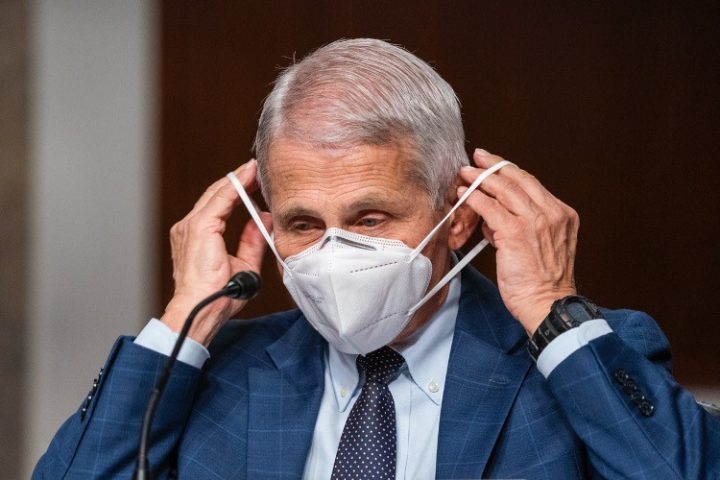
This past Sunday, President Joe Biden’s chief medical advisor, Dr. Anthony Fauci, warned Americans to “be prepared for the possibility” of Covid-related restrictions being put back into place because of the new wave of infection and waning immunity. A week ago, the doctor said exactly the opposite. In an interview on BBC’s Sunday Morning, Fauci said that American “will certainly see an increase in cases” soon.
Fauci explained that the “same conditions” that drove Covid numbers up in Europe and the U.K. in recent weeks are also in place in the United States. That includes relaxation of the Covid restrictions, “particularly indoor masking,” and the spread of Omicron’s sub-variant BA.2, which is supposedly even more transmissible than the “original” Omicron. Also, the immunity of both vaccinated and naturally immune people who have contracted other strains of Covid “tends to wane” with SARS-CoV-2, “particularly with Omicron,” said the doctor.
Echoing Big Pharma executives, Fauci also said that he “would not be surprised” if Covid boosters became a seasonal regimen, “similar to what we see with the requirement of a flu shot each year.”
Fauci said, however, that the new sub-variant, while being more transmissible, is not associated with more severe outcomes for the people infected with it. He cited the rate of utilization of ICU beds in the U.K. did not increase with the spread of BA.2.
That being said, Fauci insisted that it does not mean that people should not be worried about Covid anymore.
Asked about the possibility of reinstating lockdowns and mask mandates, Fauci did not rule it out.
“I don’t want to use the word ‘lockdowns,’” he said, “That has a charged element to it. But, I believe that we must keep our eye on the pattern of what we’re seeing with infections,” noting that the United States currently sees a downward trajectory of key Covid metrics.
While that indicates a “gradual” move toward normalcy, the trend will likely change with the virus’s evolution.
“We need to be prepared for the possibility that we would have another variant that would come along,” Fauci noted. “And then, if things change and we do get a variant that does give us an uptick in cases and hospitalization, we should be prepared and flexible enough to pivot toward going back — at least temporarily — to a more rigid type of restrictions, such as requiring masks indoors.”
Asked about the benefits of lockdowns, Fauci stressed that they “certainly prevented a lot of infections, prevented a lot of hospitalizations, and prevented a lot of deaths. There’s no doubt about that.”
Fauci went on to admit that there were some “unintended” negative consequences of lockdowns, such as learning loss in children, psychological and mental health implications, particularly in children, and “economic stress on society and individual families.”
Therefore, policymakers would need to “find a balance” between the lives saved and all of the negative impacts of the lockdowns.
Fauci’s praise of the role of lockdowns in saving lives contradicts a Johns Hopkins study published in February.
The paper, titled “A Literature Review and Meta-Analysis of the Effects of Lockdowns on COVID-19 Mortality,” found that closures of businesses, schools, and public places and stay-at-home orders that were imposed by governments worldwide did virtually nothing to curb the spread of Covid and save lives. Yet, these measures had a “devastating” and “enormous” effect on the economy, society, and public health, per the researchers.
The conclusion on the “benefits” of lockdowns was unequivocal:
“What does the evidence tell us about the effects of lockdowns on mortality?” We provide a firm answer to this question: The evidence fails to confirm that lockdowns have a significant effect in reducing COVID-19 mortality. The effect is little to none.
To achieve that “little to none” result, societies paid a hefty price:
Lockdowns during the initial phase of the COVID-19 pandemic have had devastating effects. They have contributed to reducing economic activity, raising unemployment, reducing schooling, causing political unrest, contributing to domestic violence, and undermining liberal democracy. These costs to society must be compared to the benefits of lockdowns, which our meta-analysis has shown are marginal at best. Such a standard benefit-cost calculation leads to a strong conclusion: lockdowns should be rejected out of hand as a pandemic policy instrument.
As for the nation’s “top doctor’s” predictions of the new wave of infection, it should be noted that on March 20 he said the exact opposite to what he revealed to BBC.
A little more than one week ago, Fauci said the new Covid sub-variant does not appear to cause more severe illness or evade immune responses from vaccination or prior infection.
While appearing on ABC’s This Week, he observed, “Hopefully, we won’t see a surge. I don’t think we will. The easiest way to prevent that is to continue to get people vaccinated. And for those who have been vaccinated, to continue to get them boosted, so that’s really where we stand right now.”
When asked by host George Stephanopoulos if there was any reason to reverse the relaxation of pandemic restrictions that has taken place in the past month, Fauci sounded optimistic: “I don’t think so, George, not right now. I don’t see us going back into any more really very restrictive kinds of restrictions. But you always have to have the flexibility.”





